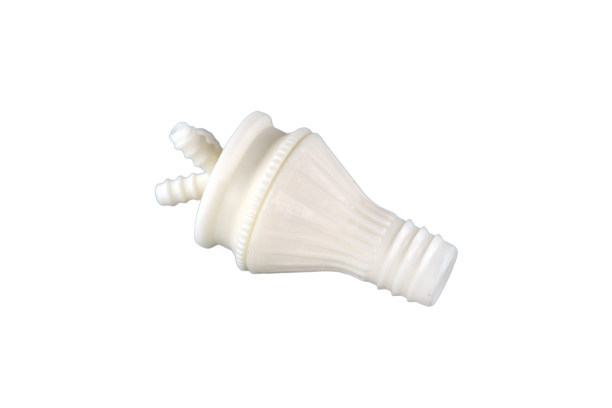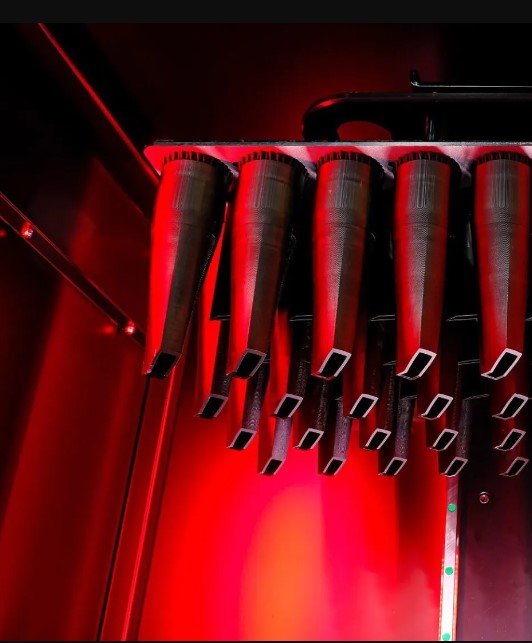Stereolithography -SLA 3D printing service
Upload your 3D file to get your SLA printing instant quote thanks to Sculpteo’s resin 3D printing service.
- ISO 9001
- Fast Turnaround
- Secure File Upload

Login
If you have any trouble logging in to your account, contact us.
Sign Up
To start 3D printing or Laser Cutting, you'll need to create an account here. Once done, you'll be able to upload your files and get live quotes of yours parts
Already have an account? Log In
Stereolithography (or SLA) is one of the oldest 3D printing techniques ever developed. This additive manufacturing process is used to 3D print resin material, using a photochemical process.
This SLA 3D printing process uses a vat of liquid photopolymer resin that can be cured. The build plate moves in small increments and the liquid polymer is exposed to light where the UV laser draws a cross-section layer by layer. The process repeats until a model is created. The object is 3D printed by pulling the object out of the resin (bottom-up) which creates space for the uncured liquid resin at the bottom of the container and can then form the next layer of the object.
Stereolithography offers a lot of advantages, it can help you for rapid prototyping, or develop your whole final product. SLA parts have a really smooth surface finish, which is particularly adapted if you need a realistic prototype with high quality and detailed features, quite similar to injection molding parts.
Thanks to its speed and accuracy, Stereolithography is an interesting manufacturing method for concept models and rapid prototyping.
If you need complex shapes, high detail precision and work on a really accurate visual, SLA 3D Printing might be a perfect choice.

High level of details
If you need accuracy, SLA is the additive manufacturing process you need to create highly detailed prototypes

Various applications
From automotive to consumer products, many companies are using Stereolithography for rapid prototyping

Design freedom
Design-driven manufacturing allows you to produce complex geometries

Are you looking for the perfect manufacturer? Sculpteo provides you the best online 3D Printing Services for your resin parts. Thanks to our expertise in Stereolithography technology, you can choose between several options, instantly receive a quote, and let us handle the manufacturing in our ISO 9001 certified factory.
Start using Stereolithography today by uploading a 3D file.
Stereolithography offers a lot of benefits, it can help you rapidly prototype, or develop your whole final product with high resolution.
These photopolymer parts do not have the strength of Selective Laser Sintering (SLS) or FDM 3D printed parts, but can typically achieve much higher levels of detail and great complex geometries. As the photopolymer is UV sensitive, these products are susceptible to deforming and changing colors in sunlight. SLA is commonly used to generate highly detailed artwork, non-functional prototypes, and can be used to make molds in investment casting applications.
SLA parts have a really smooth surface finish, which is particularly adapted if you need a realistic prototype with high quality and detailed features, quite similar to injection molding parts. But resin parts printed with Stereolithography are not suitable for functional prototypes.
SLA (Stereolithography) Prototyping resin is perfectly suited to the production of aesthetic rapid-prototypes. The finished product has a smooth, matte surface finish. SLA resin allows you to achieve a finished product look for your prototype. This SLA 3D printing technology is best suited to small/medium pieces with an elevated level of details.
Standard layer thickness – 100 µm
Accuracy: ±0.2% (with a lower limit of ±0.2 mm)
| Green | Post-cured | Green | Post-cured | Methods | |
|---|---|---|---|---|---|
| Tensile strength | 38MPa | 65MPa | 5510 psi | 9380 psi | ASTM D 638-10 |
| Tensile modulus | 1.6GPa | 2.8GPa | 234 psi | 402 psi | ASTM D 638-10 |
| Elongation at Failure | 12% | 6.2% | 12% | 6.2% | ASTM D 638-10 |
Design guidelines and capabilities for our Prototyping Resin.
Sculpteo is offering SLA prototyping resin. This 3D printing material is ideal for creating prototypes and might enhance your entire prototyping procedure. With the help of this resin, intricate pieces and unfinished prototypes may be produced.
Keep in mind that products created with SLA resins and this photopolymer may change in shape and color when exposed to sunshine. Before sending your 3D file, please be aware that you must adhere to the material’s design specifications in order to fully benefit from its advantages. Additionally, the technical section of this material page contains details about the tensile modulus, chemical resistance, and heat deflection temperature for this SLA resin material.
Post-processing is also part of the manufacturing process with Stereolithography. At the end of the process, the amount is removed form the platform and the excess resin must be removed for the 3D printed part. The part will then undergo a curing process in a UV oven, which will help the final piece reach is absolute stability.
Maybe SLA is not the perfect resin technology for you. Discover some alternatives also available at Sculpteo.
The liquid resin is contained within a vat, or tank, cured against a build platform, slowly rising out of the tank as the part is formed, layer by layer. These two 3D printing technologies are similar but have one main difference: their light source.
Like inkjet printing, polyjet printing dispenses layers of curable liquid photopolymer into a build tray rather than individual drops of ink onto paper.
Carbon created this resin 3D printing method. Continuous Liquid Interface Production, or CLIP, improves upon the drawbacks of existing 3D printing technology by prioritizing a customizable photochemical process above a conventional mechanical strategy.

Contact our sales team for your commercial inquiries
 Connect with Google
Connect with Google Connect with Facebook
Connect with Facebook